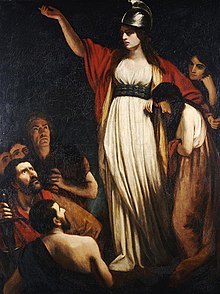Boudicca

Boudicca ([bɒʊˈdiːkaː]; also Boudica , Baudicea , Boadicea , Bodvica , Bonduca ) was a British queen and military leader who led the ultimately unsuccessful Boudicca uprising (60/61 AD) in the early years of the Roman occupation of Britain .
Life

Boudicca was the wife of Prasutagus , king of the Iceni , a Celtic tribe in what is now East Anglia ( Norfolk and Suffolk ). After Prasutagus' death, the relationship between natives and Romans deteriorated, probably due to the repressive occupation policies of Roman colonists and officials. The Romans did not want to accept a woman as a tribal leader, even if she was expressly appointed in her will as the heir to tribal rule, so they publicly whipped Boudicca and raped her virgin daughters. With this sacrilege they stirred up the discontent that was already prevalent in this Celtic tribe and Boudicca became the leader of the uprising. In AD 60, Iceni and Trinovantes rose up against the Romans and moved south together to attack and loot the Roman settlements there. Their first victim was the Camulodunum veterans' colony , now Colchester . They burned the city to the ground and killed all residents. This was followed by Londinium (London) and Verulamium ( St Albans ). Boudicca probably had more than 50,000 fighters around him, and after the initial successes, new followers were added.
While the Celtic people of Britain were sophisticated and accomplished in some ways, they were not at warfare. Their equipment was simple and the level of organization of the British warriors was in no way comparable to that of the enemy. Although they were in the majority, they had no chance in the final battle against the disciplined, better armed and well organized troops of Rome. The Roman general and governor of Britain Gaius Suetonius Paulinus , who was staying in present-day Wales for "pacification purposes" at the time of Boudicca's attacks on the south-east British Roman settlements, immediately set out for the south-west, with two legions of the British who had carried out guerrilla-like attacks until then , in a battle northwest of Verulamium - also known as the Defeat on Watling Street - in the open field in AD 61 and defeated them devastatingly.
There are two versions of the further fate of Boudicca: Tacitus reports that Boudicca took his own life through poison ( Annalen 14.37.3), Cassius Dio, however, thinks that Boudicca fell ill and finally died (62.12.6) .
Afterlife
After Boudicca was forgotten during the Middle Ages, it returned to historical consciousness with the rediscovery of ancient sources in the early modern period (often in the form of the name Boadicea or Bonduca ). John Fletcher and Francis Beaumont wrote the tragedy Bonduca in 1610 . 1753 published Richard Glover his tragedy Boadicea . In the 19th century in particular, Boudicca was often depicted (in an implied parallel to Queen Victoria ), for example by Alfred Tennyson in his poem Boadicea or by the sculptor Thomas Thornycroft in a group of statues showing her together with her daughters on a chariot and the one on the left River Thames in London at Westminster Bridge , opposite the Big Ben Tower ( 51 ° 30 ′ 4 ″ N , 0 ° 7 ′ 25.5 ″ W ).
The Boudicca material has also been used in numerous historical novels and books for young people, mainly by British authors. There are songs about Boudicca by the Dutch singer Petra Berger ( Boudicea ), the Irish singer Enya ( Boadicea ), the band The Libertines ( The Good Old Days ), the band Faith and the Muse ( Boudiccea ), the formation Mason ( Boadicea ) and in the British TV series Horrible Histories ( Boudicca ).
The British hammer film Queen of the Vikings ( The Viking Queen , 1966) by Don Chaffey refers loosely to the figure of Boudicca, who is called Salina here . In addition, Boudicca (as Boadicca ) is the main character of the 15-volume French comic series Vae victis! . Alex Kingston played the title role in the 2003 film Boudica (also known as Warrior Queen ) .
In the second, fourth and fifth part of the Sid Meier's Civilization computer game series , the Celts under Boudicca are one of the playable nations. She also plays a leading role in the computer game Ryse: Son of Rome .
In Charlotte MacLeod's detective novel Rolls Royce and Bienenstiches , many protagonists bear the first names of historical freedom heroes, including Boadicea ("Aunt Bodie") Kelling, who was kidnapped and later freed.
With Judy Chicago 's Dinner Party is set for Boadicea.
literature
- Antonia Fraser : Boadicea's chariot. The warrior queens. Weidenfeld and Nicolson, London 1988, ISBN 0-297-79486-8 .
- Caitlin C. Gillespie: Boudica. Warrior Woman of Roman Britain. Oxford University Press, Oxford / New York 2018, ISBN 978-0-19-060907-8 .
- Walter Henze : Boudicca . In: Paulys Realencyclopadie der classischen Antiquity Science (RE). Volume III, 1, Stuttgart 1897, Col. 796 f.
- Jaana Zipser: Boudica and the Romanization of Britain. British ideals and the ancient tradition. In: Christine G. Krüger , Martin Lindner (Ed.): Nationalism and Reception of Antiquity (= Oldenburg writings on historical science. Volume 10). BIS-Verlag der Carl-von-Ossietzky-Universität, Oldenburg 2009, ISBN 978-3-8142-2145-8 , pp. 23-42.
Web links
- Literature about Boudicca in the catalog of the German National Library
- Historical novels about Boudicca
- Horrible Histories . BBC series
| personal data | |
|---|---|
| SURNAME | Boudicca |
| ALTERNATIVE NAMES | Boudica; Boadicea |
| BRIEF DESCRIPTION | British army commander |
| DATE OF BIRTH | 1st century |
| DATE OF DEATH | unsure: 61 |
